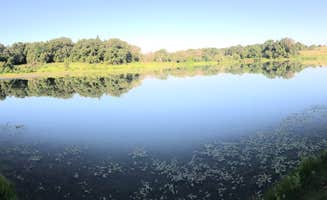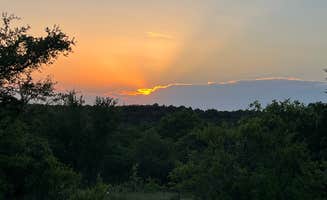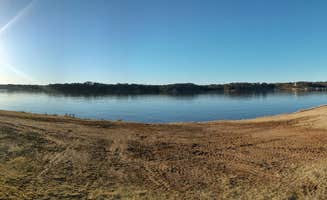LBJ National Grasslands offers free camping near Roanoke, Texas across 20,000 acres of public land. The grasslands feature several dispersed camping locations with varying terrain from open prairie to wooded areas. Temperatures range from summer highs averaging 95°F to winter lows sometimes reaching 25°F, with spring and fall providing milder camping conditions.
What to do
Fishing opportunities: Nearby ponds within the grasslands provide fishing spots for campers. At Hunter Park, visitors note "good fishing and kinda quiet for being a campsite," and others observe "the fish are active" at the park's pier.
Wildlife observation: Beyond basic camping, many visitors enjoy wildlife watching. One camper at LBJ National Grasslands Forest Road 904 reports seeing "deer, armadillos, hogs, and birds" during their stay. Bring binoculars for best viewing, particularly during early morning or evening hours.
Stargazing: The remote nature of some sites creates opportunities for night sky viewing. One camper at Lyndon B. Johnson National Grassland mentioned that if you "stay out late and turn off your lights - you'll get a night surprise," referring to the stellar views available when conditions are right.
What campers like
Privacy between sites: Campers consistently appreciate the spacing between sites. A recent visitor noted that "Remote dispersed. Great camping for north central Texas. The sites are a good distance between them. You can drive along the roads and look for them. We spotted 22 sites, there may be more."
Scenic vistas: The elevated areas within Lyndon B. Johnson National Grassland Dispersed Camping provide notable views. One visitor described finding "a pretty great vista view from which the spectacular sunset was just a great bonus" when staying overnight.
Quiet atmosphere: Multiple reviews mention the peaceful environment. A camper at Forest Road 904 described it as "Remote, quiet, simple beauty. Easy access, cool area. Worth checking out for a low profile weekender or hike," while another noted it was "Very quiet you won't hear anyone besides the wildlife at night!"
What you should know
Water availability: No potable water exists at the dispersed sites. A camper recommends "there is also a water dispensary in Decatur which is nice and convenient!" This water source is approximately 15 miles from many camping areas.
Road conditions: Access varies significantly by location. The Dead Pump Jack area has "some major ruts" and visitors advise "I wouldn't bring anything towed or longer than a B van." Always check recent conditions, especially after rainfall.
Cell service considerations: Download maps before arrival as connectivity varies. One camper reported "AT&T coverage was fairly good here, generally varying between 1-3 Bars of LTE service, with speeds up to 4.5 MB/s," but others note service can be spotty depending on location.
Safety precautions: While most experiences are positive, isolated negative incidents have occurred. Campers should practice standard safety protocols and be aware that cattle frequently graze throughout the area.
Tips for camping with families
Prepare for complete self-sufficiency: With no facilities available, families need comprehensive planning. "Pack in/pack out. Downloadable hiking maps availability on other apps," advises one regular visitor. Bring sufficient water, food, waste disposal bags, and first aid supplies.
Consider weather timing: Families should avoid summer heat when possible. The grasslands have limited shade in many areas, with one camper at Hunter Park noting "if you are car camping or tent camping, be wary about the fact that there will be little to no shade."
Proximity to civilization: Despite feeling remote, most sites aren't far from supplies. Hunter Park campers note "the nearest gas station is only about two minutes away. Very connected to civilization and it was very well kept," making it easier to manage forgotten items.
Tips from RVers
Scouting recommendations: Before bringing large rigs to unknown sites, scout ahead. One experienced RVer suggests: "If you have a tow vehicle, drop it just inside the gate, leave your RV and go scope out a suitable campsite, as turning around with a large rig is only practical in a couple of locations."
Boondocking convenience: The grasslands provide good no-hookup options for self-contained units. A first-time boondocker shared: "This was my first experience boondocking. Absolutely loved the location! Not too far from town if you need something."
Wind exposure: RVers should be aware of wind conditions, especially on elevated sites. One camper mentions "It did get rather windy but I was on top of the hill. Live and learn," suggesting lower elevation sites might provide better protection for larger vehicles.




